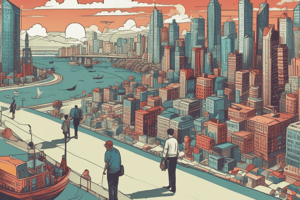Podcast
Questions and Answers
What was the expenditure on education as a percentage of GDP in 1951-52?
What was the expenditure on education as a percentage of GDP in 1951-52?
- 1.2%
- 2.8%
- 0.64% (correct)
- 3.1%
What percentage of gross enrolment ratio (GER) in higher education was recorded for the age group of 18 to 23 years in 2019-20?
What percentage of gross enrolment ratio (GER) in higher education was recorded for the age group of 18 to 23 years in 2019-20?
- 27% (correct)
- 45%
- 35%
- 50%
Which program was introduced to improve the attendance of children in schools?
Which program was introduced to improve the attendance of children in schools?
- Distance education
- Bridge courses
- Sarva Siksha Abhiyan
- Mid-day meal schemes (correct)
What was the literacy rate in India in 1951?
What was the literacy rate in India in 1951?
How much did the expenditure on education increase from the first plan to 2020-2021?
How much did the expenditure on education increase from the first plan to 2020-2021?
What term refers to working individuals in terms of their skills and abilities within a country?
What term refers to working individuals in terms of their skills and abilities within a country?
What can negatively impact a country's economy despite having human resources?
What can negatively impact a country's economy despite having human resources?
What is the relationship between human capital and economic growth?
What is the relationship between human capital and economic growth?
Which revolution is cited as an example of improving productivity through technology?
Which revolution is cited as an example of improving productivity through technology?
What is a key feature of human capital formation?
What is a key feature of human capital formation?
Which sector involves activities like agriculture and fishing?
Which sector involves activities like agriculture and fishing?
What is the consequence of parents being uneducated and lacking hygiene?
What is the consequence of parents being uneducated and lacking hygiene?
What sector includes trade, transport, and communication?
What sector includes trade, transport, and communication?
What has been the priority of the country's national policy regarding health?
What has been the priority of the country's national policy regarding health?
What type of unemployment is commonly found in urban areas?
What type of unemployment is commonly found in urban areas?
Which states have the maximum number of medical colleges in India?
Which states have the maximum number of medical colleges in India?
What impact does unemployment have on the economy?
What impact does unemployment have on the economy?
What is a significant reason for the decline in dependence on agriculture?
What is a significant reason for the decline in dependence on agriculture?
What is the primary characteristic of small-scale manufacturing in the secondary sector?
What is the primary characteristic of small-scale manufacturing in the secondary sector?
Which population age group is classified as the workforce population?
Which population age group is classified as the workforce population?
What is highlighted as a dearth in urban areas despite educated unemployment?
What is highlighted as a dearth in urban areas despite educated unemployment?
What are the two main parts of economic activities?
What are the two main parts of economic activities?
How does education affect women's earnings in the workforce?
How does education affect women's earnings in the workforce?
Which of the following is NOT a factor that contributes to the quality of the population?
Which of the following is NOT a factor that contributes to the quality of the population?
What impact does education have on society and national income?
What impact does education have on society and national income?
What are non-market activities primarily associated with?
What are non-market activities primarily associated with?
Flashcards are hidden until you start studying
Study Notes
People as Resources
- Definition encompasses the workforce and their productive skills and abilities in a country.
- Human capital boosts GDP by enhancing individual production capabilities.
- Potential negative impacts include health issues, education deficits, unemployment, and food insecurity.
Human Capital Formation
- Involves education and health that enhance a country's productivity and returns.
- The Green Revolution exemplifies improved technologies that increased land productivity.
- Human capital is considered superior to land and physical assets.
Educational Influence
- Educated parents invest more in their children's education and uphold good nutrition and hygiene.
- Vicious cycles of disadvantage arise when uneducated parents perpetuate uneducated environments for their children.
Economic Activities
- Classified into three sectors:
- Primary: agriculture, forestry, animal husbandry, fishing.
- Secondary: manufacturing.
- Tertiary: trade, transport, communication, tourism.
- Economic activities contribute to national income and can be categorized as market and non-market activities.
Gender Disparities in Workforce
- Women often possess lower education and skills, resulting in lower pay and job insecurity compared to men.
- Higher educational attainment among women promotes pay equity, especially in fields like medicine and teaching.
Quality of Population
- Depends on literacy rates, health and life expectancy, and skill formation, directly influencing a country's growth.
- Literate and healthy populations are viewed as assets to economic development.
Education Statistics
- Significant rise in expenditure on education: from ₹151 crore in the first plan to ₹99,300 crore in 2020-21.
- Percentage of GDP dedicated to education increased from 0.64% in 1951-52 to 3.1% in 2019-20.
- Literacy rate improvement from 18% in 1951 to 85% in 2018, with higher male literacy compared to females.
- Primary school system expanded to 778,842 by 2019-20.
- Initiatives like Sarva Siksha Abhiyan were started to promote education for children aged 6 to 14.
Health Infrastructure
- Health is crucial for well-being and national priority to enhance healthcare accessibility.
- Over decades, India has built significant health infrastructure with 542 medical colleges and numerous dental colleges.
Unemployment Challenges
- Workforce age defined as 15 to 59 years; unemployment varies between rural and urban settings.
- Rural areas experience seasonal and disguised unemployment, while urban areas face educated unemployment.
- Unemployment represents wasted resources, transforming potential assets into liabilities for the economy.
- Labor dependence on agriculture is declining, leading to shifting labor towards secondary and tertiary sectors.
Emerging Economic Sectors
- Increased presence in small-scale manufacturing and emerging service industries including biotechnology and information technology.
Studying That Suits You
Use AI to generate personalized quizzes and flashcards to suit your learning preferences.




